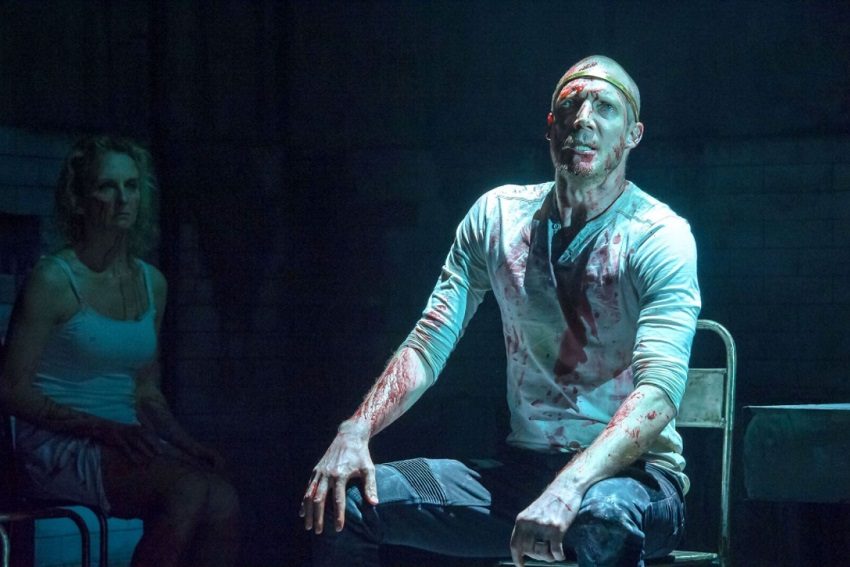Review: Macbeth

The second show from State Theatre Company SA’s new ensemble brings Macbeth to life in a vivid, modern and bloody realisation of the classic text.
Before Macbeth begins, the audience examines a gritty, greasy and modern set. Its water stains, concrete and broken tiles are reminiscent of an East-German bunker, or something from the darker moments of TV’s Homeland. One looks at the wall-mounted radiator in the corner and wonders if Macbeth will handcuff a foe to it at some point in the show.
Lights come up and Macbeth roars into life. Our first scenes are all the sound and fury of the kingdom’s glorious victory in battle thanks, of course, to Macbeth (Nathan O’Keefe). It all moves fast, hammering out exposition and the dynamics of the court of King Duncan (Peter Carroll) and could feel rushed to some. Whether the actors are warming up here, or the direction and abridged script require this pace is hard to say.

It soon finds its rhythm, however, and the audience is sucked into the vortex of Macbeth’s vaulting ambition. Nathan O’Keefe is excellent as the eponymous tortured lord, oozing a sick charm throughout, ever more ferocious as his fear, guilt and paranoia consume him. Anna Steen is just as good as Lady Macbeth, particularly shining in her own vicious monologues that set a tingle up the spine.
With its many complex layers of production, this Macbeth isn’t one to leave the magic behind. Rachel Burke’s creepy witch patrols the stage constantly, like a wandering Sword of Damocles, salivating blood and spitting it on our doomed players when they meet their end. Their ghosts reappear constantly as well, taunting Macbeth from beyond the grave. The apparition of Banquo (Dale March) at the dining table is the highlight of these supernatural scenes, thanks to the clever design, March’s stoic silence and O’Keefe’s terrified ramblings.
State Theatre’s young ensemble carry out the performance with grit and determination, but compliments must also be paid to its guest cast members. Christopher Pitman and Elena Carapetis are strong as the Macduffs, while Peter Carroll projects regal authority as King Duncan and almost steals the show in his hilarious turn as the porter.

Slick choices in stage and lighting design from respective designers Victoria Lamb and Geoff Cobham heighten the mood and keep the show’s momentum moving. The transition of the floor’s concrete and iron drain into a massive medieval-looking table and dramatic lighting of action upon it is just one example of these clever decisions.
It’s certainly a cinematic feel throughout, aided by composer DJ Trip and sound designer Andrew Howard’s moody soundtrack. Sometimes the music’s beat run in contrast to the rhythm of the actors’ prose, which feels slightly off, but it adds tension and atmosphere for the most part.
As with much of director Geordie Brookman’s work, this is not a classical staging of Macbeth, and seeks to update the show’s setting to something more recognisable and modern. Here Brookman doesn’t set the show in a specific period of history, or dress the characters in the military fatigues of a modern nation-state. It’s a smart choice not to explicitly project present-day politics onto this old text, but still put forward an aesthetic that this audience can relate to.
Macbeth continues at the Dunstan Playhouse until September 16.